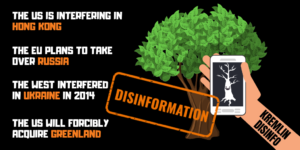 It can be tough to craft regulations and national security policies for data and technology that do not fall afoul of democratic and capitalist values, according to Eric Rosenbach, co-Director of the Belfer Center at the Harvard Kennedy School and Former Assistant Secretary of Defense and Katherine Mansted, Senior Adviser for Public Policy at the Australian National University’s National Security College.
It can be tough to craft regulations and national security policies for data and technology that do not fall afoul of democratic and capitalist values, according to Eric Rosenbach, co-Director of the Belfer Center at the Harvard Kennedy School and Former Assistant Secretary of Defense and Katherine Mansted, Senior Adviser for Public Policy at the Australian National University’s National Security College.
A national information strategy can sound, or indeed become, Orwellian without the right political leadership. But to thrive in the twenty-first century, democracies must now put information at the center of domestic, security, and foreign policy, they write for Foreign Affairs:
After reinforcing its defenses, the United States should expose the malign tactics and shadowy networks of its adversaries. Evidence of bribery, state sponsorship of organized crime, the employment of cyber-mercenaries, and attempts to interfere in Western democratic processes must see daylight outside the memos of intelligence services. Such exposure should form a core plank of public information campaigns that reveal China and Russia’s corrupting and coercive behaviors.
Authoritarian governments like those of China and Russia are ultimately brittle. Their legitimacy does not rest on freedoms and elections, but rather on the control and manipulation of information. They are therefore highly susceptible to cyberattacks that would crack open their tightly controlled information environments. U.S. leaders should explicitly signal that information attacks against the United States will spark serious retaliation.
“To effectively meet authoritarian countries on the field of information competition, democracies will have to perform a balancing act,” they add. “They must defend their information environments from subversion but redouble efforts to protect individual rights and democratic institutions.”
 Practical steps constitute only the first stage of democratizing information in the new environment, says a leading analyst.
Practical steps constitute only the first stage of democratizing information in the new environment, says a leading analyst.
Wise regulation won’t be a cure-all—it will just even out the playing field so that those of us who want to save deliberative democracy can start to compete with the forces that seek to sow mistrust and extreme polarization, argues Peter Pomerantsev, director of the Arena Program at the London School of Economics.
Sadly, media itself has failed in this task— either because it is still stuck in a broadcast model, as with most public service media, and hasn’t learnt to really work the internet, or, as in the case of most other media, because it has opted to play into the polarization. This is understandable, as the ad-tech through which much media is funded rewards polarization and partisanship—that’s what drives likes and shares and makes things go viral, he writes for The American Interest:
A new approach to social media would need to be able to ignore such immediate financial demands. It would need to work with another set of metrics: Does a piece of content improve trust, and does it generate a constructive conversation? Indeed, how can one move beyond mere content production into a more hybrid approach to foster sustained online and offline engagement? There are small, interesting experiments in this field, but they need to be replicated at scale. A new approach will need a new iteration of civil society whose dedicated mission this is. It will need to utilize the audience analysis and data mining that the manipulators use, but to do so in a transparent way, and with the opposite aims.
We are in a race with the propagandists as to who can understand and engage audiences best—but at the moment we are not even on the tracks, adds Pomerantsev, the author of This Is Not Propaganda: Adventures in the War Against Reality and Nothing is True and Everything is Possible: The Surreal Heart of the New Russia. RTWT
 Disinformation disseminators are no longer concerned with convincing audiences of their point of view; rather, they seek to sow confusion and doubt. Instead of winning an argument, they instead relish in starting one, adds John F. Lansing, CEO and Director of the U.S. Agency for Global Media.
Disinformation disseminators are no longer concerned with convincing audiences of their point of view; rather, they seek to sow confusion and doubt. Instead of winning an argument, they instead relish in starting one, adds John F. Lansing, CEO and Director of the U.S. Agency for Global Media.
The changing world demands from us an agility that allows us to meet the unique needs of truth-starved audiences, no matter the disinformation tactics or restrictions on free media under which they struggle. Since joining USAGM (then the Broadcasting Board of Governors) in September 2015, the organization has put a priority on being nimble and responsive to audience needs and changing threats by
- shifting to a digital-first production approach, which allows us to tailor the content and delivery platform to meet each audiences’ needs;
- launching new 24/7 digital global networks in key languages (Russian, Persian, and soon, Mandarin) to target at-risk populations and their influential diasporas; and
- maximizing our ability to inform, engage, and connect with our audiences by focusing on impact, rather than just reach.

EU vs Disinfo
In environments where debate is halted, we provide platforms that give safe harbor to open discourse and sharing of ideas. A perfect example of this is MBN’s Raise Your Voice, which provided a public sphere of sorts for people suffering under the control of ISIS.
In cases where spin gets out of control, we provide in-depth analysis and balanced reporting. Where truths get distorted, we provide well-sourced, evidence-based fact checking, through initiatives such as RFE/RL’s Footage vs. Footage, or the digital platforms Polygraph and Faktograph at VOA and RFE/RL. RTWT







